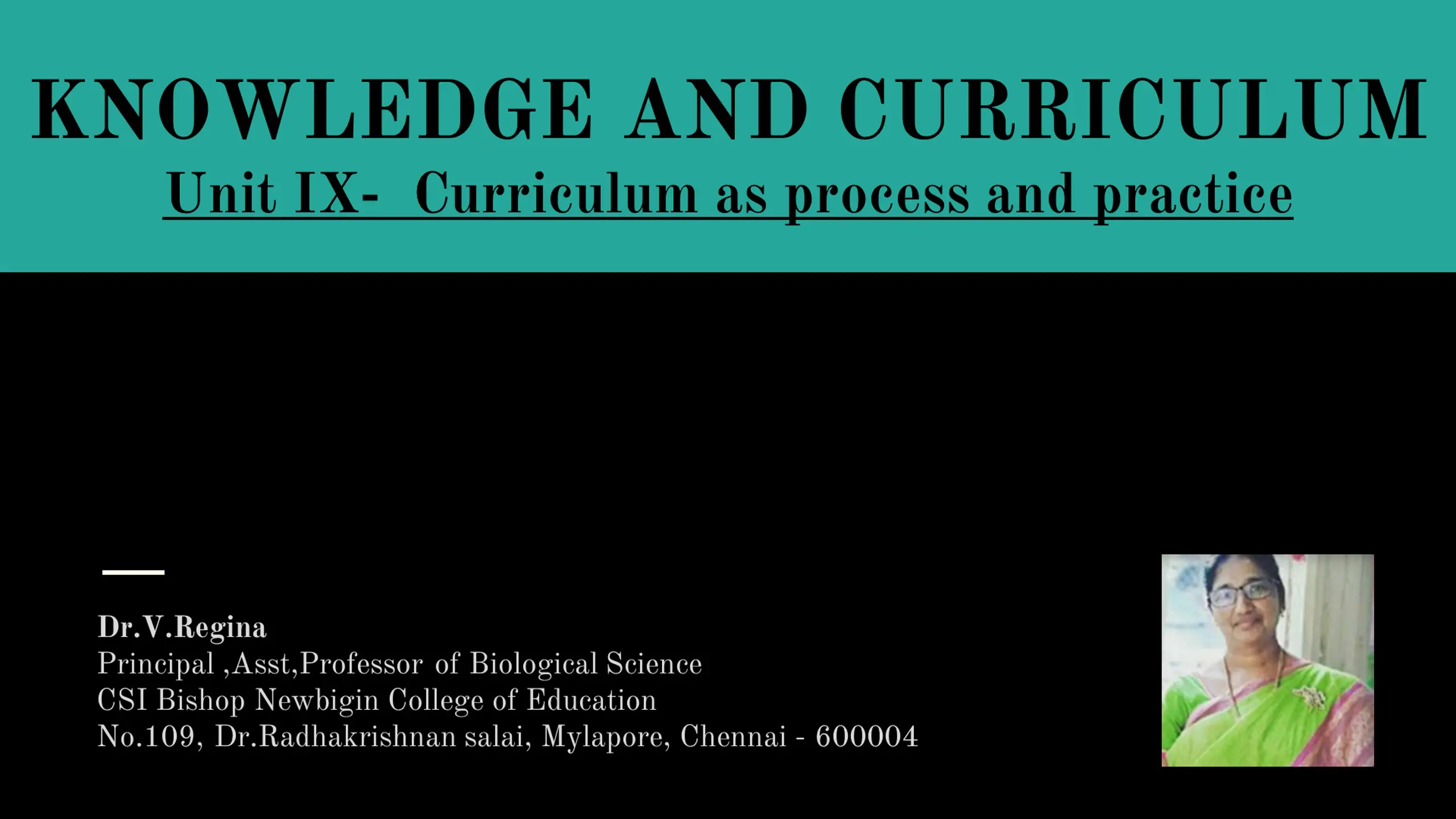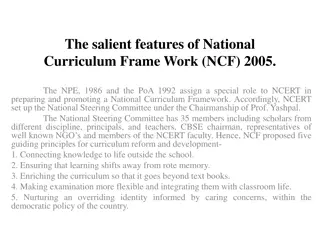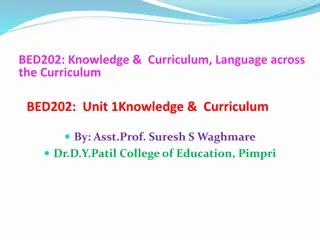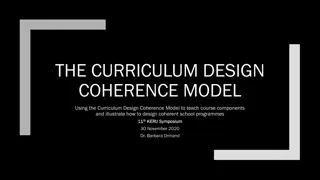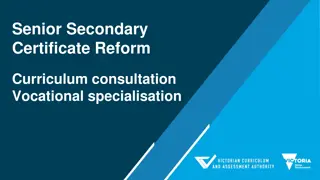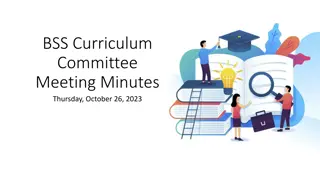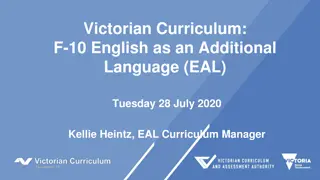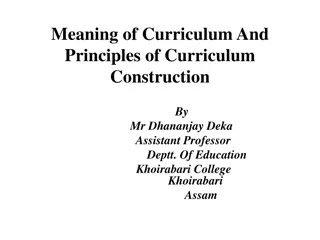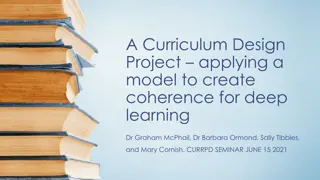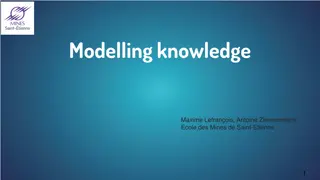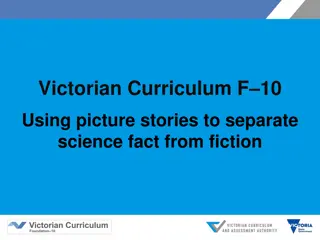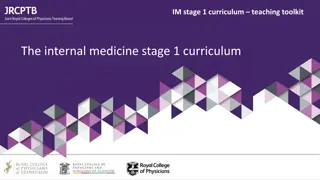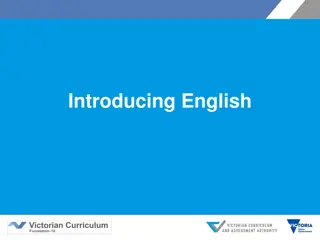Knowledge and Curriculum
Various forms of curriculum, the importance of curriculum, new trends in education, and the relationship between power and ideology in curriculum development. Understand the role of the state in curriculum development and the impact of meritocracy on the curriculum.
Download Presentation

Please find below an Image/Link to download the presentation.
The content on the website is provided AS IS for your information and personal use only. It may not be sold, licensed, or shared on other websites without obtaining consent from the author.If you encounter any issues during the download, it is possible that the publisher has removed the file from their server.
You are allowed to download the files provided on this website for personal or commercial use, subject to the condition that they are used lawfully. All files are the property of their respective owners.
The content on the website is provided AS IS for your information and personal use only. It may not be sold, licensed, or shared on other websites without obtaining consent from the author.
E N D
Presentation Transcript
KNOWLEDGE AND CURRICULUM Unit IX- Curriculum as process and practice Dr.V.Regina Principal ,Asst,Professor of Biological Science CSI Bishop Newbigin College of Education No.109, Dr.Radhakrishnan salai, Mylapore, Chennai - 600004
Introduction Curriculum Forms of curriculum Curriculum process Curriculum importance New trends in education Synopsis Role of the state in curriculum development Meritocracy and its impact on curriculum Relationship between power , ideology and the curriculum Dr. V. Regina , Principal CSI BISHOP NEWBIGIN COLLEGE OF EDUCATION
To impart knowledge the instructional activities To improve students achievement Learning Objectives To accomplish and employed in making curriculum decisions To impart knowledge grounded in the discipline of art, rationale, aims and content of the curriculum. Analysed approach assessment methods Reviewed curriculum review committee and formation. Learning Outcomes Understands the learning objectives of designing curriculum Describes incorporating an evaluative stage. Dr. V. Regina , Principal CSI BISHOP NEWBIGIN COLLEGE OF EDUCATION
The process of developing an elementary art curriculum intended for national distribution is described with special attention to theoretical and practical criteria employed in making curriculum decisions. Curriculum as a set of subjects we face a much simpler task than the school that takes uopn the responsibility for all Introduction experiences the learner has both inside and outside the school. Curriculum is composite of entire range of experiences the learner undergoes of school or college. It ia a systematic arrangement of the sum total of selected experiences planned by a school or college or defined group of student to attain the aims of particular educational program. Dr. V. Regina , Principal CSI BISHOP NEWBIGIN COLLEGE OF EDUCATION
Curriculum Content + Principles of teaching and learning = Curriculum Forms of curriculum The Theoretical The Practical The Productive There are 3 basic types of curriculum design Syllabus Process Product 1. Subject- centred design 2. Learner- centered design 3. Problem- centred design Praxis It is helpful to approach curriculum theory and practice in the light of aristotle influential categorization of knowledge into 3 disciplines The Theoretical The Practical The Productive Dr. V. Regina , Principal CSI BISHOP NEWBIGIN COLLEGE OF EDUCATION
Curricular Process 1. Formulating education objectives : The Philosophies 5. Evaluating the curriculum: The curriculum serves as a framework within which an organisation, process is the success or failure depends on the educational school or college or educational program can function with enterprise by means of some measurement and assessment of an objective and purpose. change in behaviour. 1. Criteria for content selection : The selection, organisation 6. Assessment of Educational needs: Felt needs and guidance of students learning experiences should be real needs observed needs are interconnected. submitted to continuous appraisal by the faculties. 7. Development tryout: will gather empirical data 1. Organising the content : Continuity , sequence and to support whether the curriculum is relevant useful reliable and integration must be included. valid. 1. Selecting learning experience: learning experience is defined as an interaction between the student and condition in environment which she/he can react. Dr. V. Regina , Principal CSI BISHOP NEWBIGIN COLLEGE OF EDUCATION
Curriculum Importance Criteria of suitable teachers. Explicit curriculum is important in ensuring that teaching occurs. Selection of suitable methods. Explicit curriculum prevents excessive overlaps across Reflects trends in education. grade levels. Providing suitable knowledge. Curriculum needs to be organised. Proving suitable activities and experiences. And explicit curriculum makes differentiated instruction possible. Providing wholesome influences Achievement of educational aims. Dr. V. Regina , Principal CSI BISHOP NEWBIGIN COLLEGE OF EDUCATION
New trends in education Adaptive learning algorithms. Live stream teaching Mobile learning. School - to - school learning Maker tinkering. 3D printing. Let school questions guide everything. Self - directed learning. Artificial intelligence. Reverse gamification New learning taxonomies. Virtual reality. Dr. V. Regina , Principal CSI BISHOP NEWBIGIN COLLEGE OF EDUCATION
Role of state in curriculum development Helps to propagate the concepts and principles of It plays a major role in curriculum construction, curriculum development and its implementation and implementation, evaluation, research and reconstruction also conducts evaluation and research on curriculum. thought their educational departments. It formulates philosophies objectives , syllabi, and It permits the schools / colleges/ to start and continue the framework of all the courses. It will give permission to course according to the infrastructure. start and to continue the course. It can stop a program if it feels that's schools/ college is not providing necessary It is responsible for the proper curriculum development facilities. and implementation in the schools on the basis of leaderships provided by the national bodies. Recommended by tge 86 NPE, 1988 NCF, and also 2019 NEP. Dr. V. Regina , Principal CSI BISHOP NEWBIGIN COLLEGE OF EDUCATION
Language The policy of using english as medium of instruction beginning in class 1 is being implemented in all the private, unaided school throughout the country. In 2019 NEP till 5th standard mother tongue is the medium of instruction. Other scholastic areas Several has modified NCF science and social science recommendations. Schooling starting from 3 years of age onwards. From school education to higher education the NEP envisions to provide a new structure to education sector to the country. Dr. V. Regina , Principal CSI BISHOP NEWBIGIN COLLEGE OF EDUCATION
Major reforms school Educations Universalisation of early childhood care education. (ECCE) Gender inclusion fund.. National mission on foundation literacy and numeracy.. KGBVs upto grade 12. 5 + 3 + 3 + 4 curricular and pedagogical structure. Reduction in curriculum to corre concepts. Curriculum to integrate 21st century skills, mathematical Vocational integration from class 6 onwards. thinking and scientific temper Universities to be named not on the basis of ownership No rigid separation between art and sciences between but on quality on education curricular and extracurricular activities, between vocational and academic streams. NCTE will act as professional standard setting bodies (PSSB s ) Education of gifted children. Dr. V. Regina , Principal CSI BISHOP NEWBIGIN COLLEGE OF EDUCATION
Personification and genetics : it the incentive approach to merit it is characteristic of actions to personal quality. Deserts and entitlement : an incentive argument is entirely instrumental related to results. Meritocracy and its impact on curriculum Distribution independence: the results desired have a string distributive components , with a preference for equality, then in assessing merits , concern about distribution and inequality would enter the evaluation. Dr. V. Regina , Principal CSI BISHOP NEWBIGIN COLLEGE OF EDUCATION
Relationship between power ideology and the curriculum Educational decisions are all ideological decisions. The uniform organisation of the educational system for all children. The argument claiming that every educational decisions is ideological to all levels of educational activities. A class or cultural segregation in schools. Laws of compulsory education and its duration Religious education for all or separation of religion from public education, all are clearly ideological The levels of allocation of economic resources to education decision. in comparison to other areas of social activity Philosophy of education or pedagogy theory of education, educational outlook are nothing but ideology. Dr. V. Regina , Principal CSI BISHOP NEWBIGIN COLLEGE OF EDUCATION
Relationship between power ideology and the curriculum Knowledge Functions of education in formation of ideologies and identity. Factors which influence the national education system and form identity and ideology of a country. Thus education system includes the full range of learning opportunities available in a country , whether they are provided or financed by public or private sector that sustains it. Learner Teacher Dr. V. Regina , Principal CSI BISHOP NEWBIGIN COLLEGE OF EDUCATION
Teachers enter particular schooling and situations with a personal but shared idea of the good and a commitment to human emancipation , an ability to think critically - in action understanding of their role and their expectations others have if them and a proposal for action which sets out essential principles and features of the educational encounter. Theory Conclusion Praxis Reflections Reflection action While the process model is driven by general principles and places an emphasis on judgement and meaning making, it doesn't make explicit statement. Dr. V. Regina , Principal CSI BISHOP NEWBIGIN COLLEGE OF EDUCATION
Suggestive Readings Laura H. Chapman, curriculum development has process and product (1985). Nursing education , BT Basavanthappa 2003 Jaypee brothers. http://www.moe.goc.tt/curriculumprocess.html Dr. V. Regina , Principal CSI BISHOP NEWBIGIN COLLEGE OF EDUCATION
